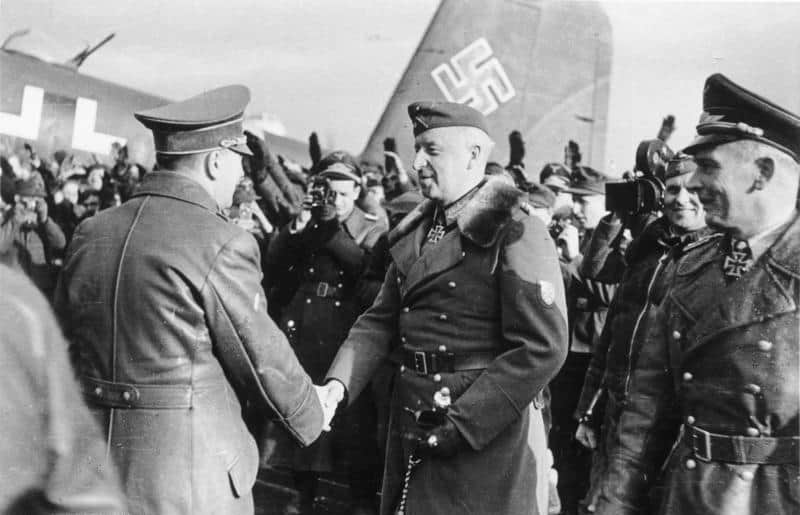
On 10 March 1943, under heavy security, Adolf Hitler flew in to Army Group South’s headquarters at Zaporozh’ye, Ukraine. Seen here, Generalfeldmarschall Erich von Manstein, shaking hands on right, is greeting Hitler. on left, on the local airfield; on the right are Hans Baur and the Luftwaffe Generalfeldmarschall Wolfram von Richthofen[freigegeben am 18.3.1943] Click here for more information. Click to enlarge.
By: Phil Kohn. Dedicated to the memory of his father, GM3 Walter Kohn, U.S. Navy Armed Guard, USNR, and all men and women who have answered the country’s call in time of need. Phil can be contacted at ww2remembered@yahoo.com.
The German High Command on March 12, 1943, orders Army Group Don eastward to Chuhuiv, Ukraine, to cut off Soviet forces south of Kharkiv. In Russia, the Soviet 5th Army captures Vyazma, 143 miles west of Moscow. In Tunisia, the 2nd New Zealand Division and the British 8th Armored Brigade are surreptitiously moved southward from Medenine. They are being concentrated west of Wilder’s Gap, in preparation for a flanking move around the Afrika Korps’s Mareth Line. In Italy, over 100,000 workers go on strike in Genoa, Milan and Turin, halting war production. The stoppages reflect growing disillusionment among the populace with how the Fascist government of Mussolini is conducting the war and protecting the citizenry.
Following a brilliant offensive, German Army Group Don on March 13 enters Kharkiv, Ukraine, recently lost to the Red Army. German troops liquidate the Jewish ghetto in Kraków, Poland, removing the last 10,000 Jews remaining in the city. In Germany, “Operation Flash,” an attempt by anti-Nazi German Army officers to assassinate Hitler, fails when the detonator in a bomb placed on der Führer’s airplane proves defective and doesn’t go off. Also in Germany, as the nation sustains significant losses on the battlefield — and bombs fall on the German homeland — dissatisfaction with the Nazi regime, while muted, begins to grow. In Asia, a Chinese counterattack throws the Japanese back across the Yangtze River.
As his spearheads reach the Donets River on March 14, Field Marshal Erich von Manstein’s Army Group Don has trapped and destroyed the Soviet Third Tank Army. In all, the Red Army has abandoned nearly 6,000 square miles of newly won ground in the face of Manstein’s armored counteroffensive, which has stabilized the German front in southern Russia, and averted a total Axis collapse.
Headquartered in Western Australia, the U.S. Navy’s Southwest Pacific Force, commanded by Vice Adm. Arthur Carpender, is renamed the Seventh Fleet on March 15. The force, responsible for operations off New Guinea, is often referred to as “MacArthur’s Navy.”
On March 16, the first reports of the Katyn massacre filter into the West as the Germans announce they have found a mass grave containing the remains of 3,000 Polish Army officers in woods near Katyn, Russia. The Germans accuse the Soviets of the atrocity. When the Germans retreat, the Soviets take over the area, claiming that the Germans killed the Poles. (It is much later determined that over 22,000 Polish military officers, policemen, intellectuals, land owners, factory owners, attorneys, doctors, elected officials, priests and other civilian prisoners of war had been executed in various locations by the NKVD [the Soviet Secret Police] in April and May of 1940, during the Soviet invasion of Poland. The massacre was so named because the mass grave at Katyn was the first of several found.) In Washington, President Roosevelt receives a letter from Joseph Stalin yet again urging that a second front be opened in Europe.
The Japanese on March 17 attack British positions in Arakan, western Burma, forcing the British back. The U.S. Army’s II Corps begins an advance in Tunisia. II Corps is now commanded by Lt. Gen. George S. Patton. He replaces Lt. Gen. Lloyd Fredendall, who was removed after his defeat at the Battle of Kasserine Pass in late February. Bulgaria, an Axis ally, refuses German demands that Bulgarian Jews be deported to Nazi concentration camps. It is believed that, as a result of this stand, no Bulgarian Jews went to Nazi gas chambers from Bulgaria itself (although Jews were deported from Bulgarian-controlled areas in Macedonia and Thrace).
British Gen. Orde Wingate’s Chindit guerrilla forces cross the Irrawaddy River in Burma on March 18. In South America, the Vichy French government of French Guiana is overthrown by a pro-Allied group.




